
The nature of truck driving exposes you to numerous factors which can negatively impact on your metal health. These factors can include:

Working long hours, often in isolation

Sleep deprivation

Stress and pressure to meet deadlines

Financial stress

Drug and alcohol problems

Low physical activity

Lack of work, life balance

Poor eating habits

Shift work
WHAT IS MENTAL HEALTH?
Being mentally healthy is not just about avoiding mental health issues. Everyone goes through ups and downs in life. To keep good mental health, people need to find the right ways to keep their life balanced. Visit the NZ Health Navigator website and look at the different ways of keeping mentally well.
WHAT IS MENTAL ILLNESS?
Mental illness is any disease or mental health condition that can influence the way a person feels, thinks, behaves and/ or relates to others. These conditions are disorders that affect your thinking, mood and behaviour, and can go on to significantly affect your work, relationships and quality of life. Mental health conditions commonly found amongst truck drivers are depression and anxiety.
Mental illnesses can develop in different ways, i.e. through stress, reaction to life events, and many other triggers than are listed below.

Mental health problems can be difficult to recognise as the symptoms vary from person to person. People may hide how they are feeling to avoid what others might think about them.


DON'T IGNORE THE EARLY WARNING SIGNS!
Stress is a common causes of mental illness. If you are experiencing these signs of stress on a regular basis, you need to start looking at what changes you can make in your life and reach out for help.
Helpguide.org provides useful information about stress management and self-help techniques.
If you are experiencing high levels of stress, do not hesitate to talk it through with someone.
The Mental Health Foundation's 'Stress and How to Handle it' is another useful resource.


Starting the conversation may seem difficult at first, but ignoring the issue will not make it better. Depression is not a sign of weakness or failing. If you need help, reach out to someone you trust and do not isolate yourself. Be honest if you are struggling with something. If you want to talk to a professional, check out the MHERC website for a list of support groups and counsellors. If you need help now call Lifeline: 0800 453 354

-
Intense feelings of despair and hopelessness that interfere with work, family and your ability to enjoy life.
-
Physical symptoms including back pain, headaches, sleep & sexual problems and appetite changes.
-
Symptoms of anger, ranging from irritability, sensitivity to criticism, road rage, loss of sense of humour, short temperedness and even physical violence.
-
Struggling to think clearly, reckless behaviour that could include unsafe driving.
For more information about the signs & symptoms of depression from the Mental Health Foundation CLICK HERE.
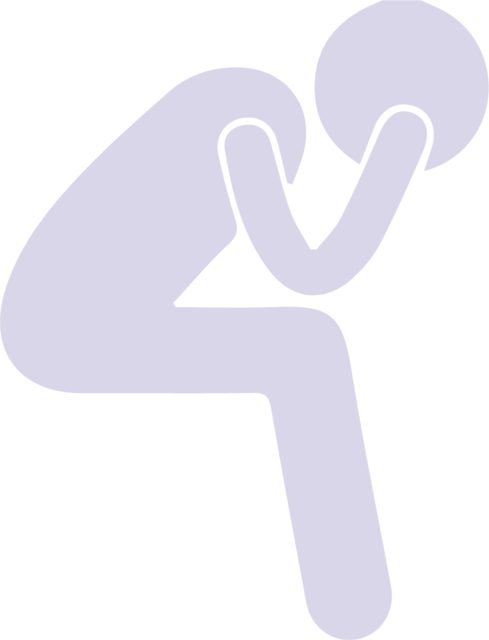

Depression can affect anyone of any age, race and sex. Typically men are thought to experience depression as much as women, however they are less likely to ask for help. This is usually because men are more concerned with being competitive and successful, they don't like to admit that they're vulnerable, they may think that asking for help is a sign of weakness and may feel as though they need to be tough and self-reliant. There are risk factors that can make people more susceptible to depression and can include:
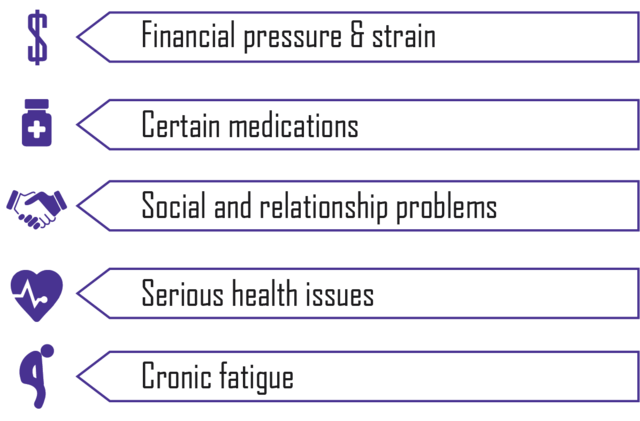
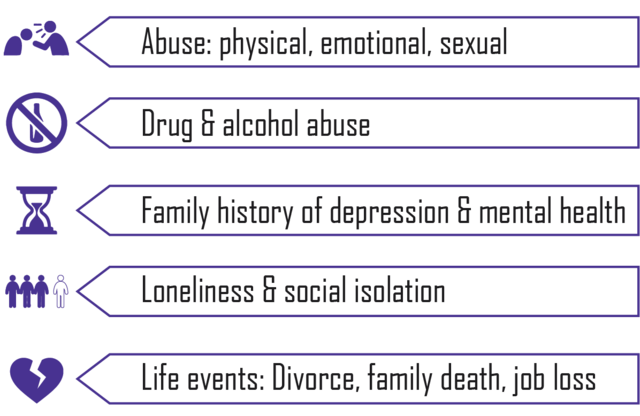

Once diagnosed correctly, there is plenty you can do to manage and treat depression. You are not alone and it's okay to admit if you are feeling depressed.
Depression is not something you can 'toughen up' and get over. Treatment involves a combination of therapy, counselling, sometimes antidepressants and a number of lifestyle changes including diet and exercise.
To learn more about depression start by visiting the Mental Health Foundation website.
depression.org.nz has a depression test online and you can sign up for The Journal, a free online tool to help you learn and practice skills to get through depression.
They also offer free 24/7 help, call 0800 111 757 or text 4202.
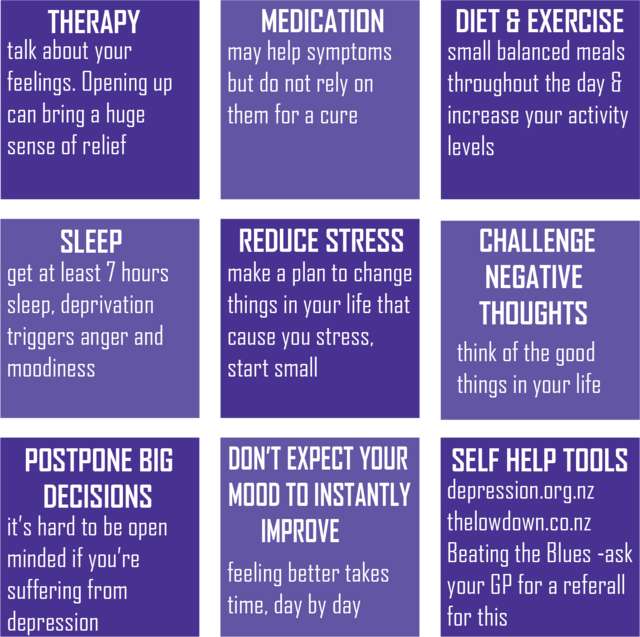

Suicide is a very difficult topic to address, but there needs to be more discussion about the causes, warning signs and where or how to get help. Having suicidal thoughts can be overwhelming and terrifying. It can be hard to know what to do or who to talk to. The Mental Health Foundation developed a book, put together by people who have lived through suicidal thoughts and experiences, CLICK HERE.
Men are 4 times more likely to choose suicide than women.

If you are worried that someone might be thinking of suicide, don't be afraid to ask them about it directly.
The Mental Health Foundation have a booklet of advice for Families, Whanau and Friends, Are you Worried Someone is Thinking of Suicide?
Someone may be at higher risk of suicide if they have:
- Depression
- An addiction to alcohol, drugs or gambling
- Lost a family member or friend
- Been a victim of violence, bullying or sexual assault
- Recently broken up from a relationship
- No strong relationships with friends or family
- Lost a job, struggling to find work
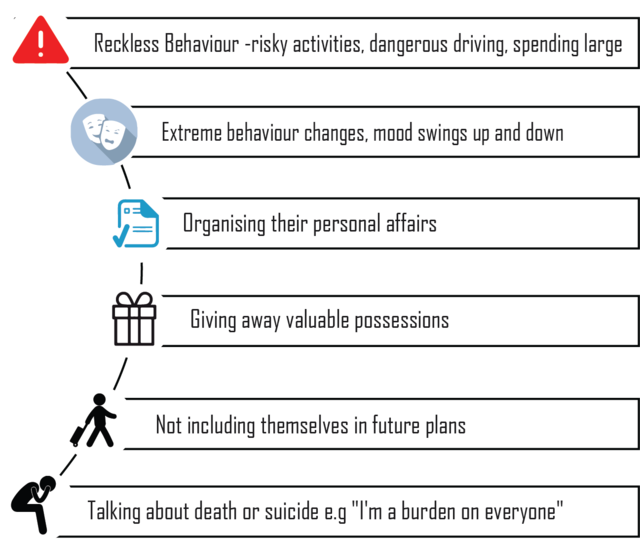

Depression, stress and anxiety can be contributing factors to suicide and are common in our industry. This can be especially true for drivers who are away from home for long periods of time, often alone and with no one to talk to about their problems. But there is a lot of 24/7, free help available.


Lifeline:
0800 543 354

Depression Helpline:
0800 111 757

Healthline:
0800 611 116

Suicide Crisis Helpline:
0508 828 865

Need to Talk?
Free call or text 1737

Samaritans:
0800 726 666

- Take the lead - ask how they are feeling and let them know that you are happy to talk about anything.
- Share - talk about your experiences if you can
- Body language - be relaxed and open to build their trust. Fully engage, don't watch the clock.
- Avoid the clichés - 'toughen up' and 'it will pass' are not helpful phrases. Be open-minded and supportive.
- Ask to help - ask them if there is anything you can do for them. Take them to a GP, counsellor or hospital.
- Don't delay - if someone reaches out to you don't put them off, make time now.
- If you know someone is suicidal take them to a GP or hospital immediately.

TAKE ANY SUICIDE TALK OR BEHAVIOUR SERIOUSLY - IT'S A CRY FOR HELP!
This chapter will guide you through the importance of a healthy, balanced diet, provide recipes for the Healthy Trucker Balls and give you some suggestions for on the road snacks and food swaps.






